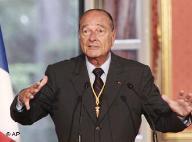France pledges 2,000 troops for Lebanon peace

French soldiers from the U.N. Lebanese peacekeepers unit prepare to paint the UN sign on their armored personnel carrier Aug. 24, at Naqoura, the U.N. headquarters near the southern border of Lebanon. (AP Photo/Francois Mori)
UN troops, driving in their personnel armoured vehicles, arrive at a hospital in Marjayoun, Lebanon (AP / Lotfallah Daher)
French President Jacques Chirac (AP / Patrick Kovaric)
France pledges 2,000 troops for Lebanon peace
Updated Thu. Aug. 24 2006 11:40 PM ET
CTV.ca News Staff
France has pledged 2,000 troops to join the UN peacekeeping force in southern Lebanon, President Jacques Chirac announced Thursday.
The troops will help reinforce 2,000 soldiers already part of the UN Interim Force in Lebanon (UNIFIL), and far exceeds the initial 400 Chirac had promised.
"Two extra battalions will go on to the ground to extend our numbers within UNIFIL," said Chirac in a nationally televised address. "Two thousand French soldiers are thus placed under blue helmets in Lebanon."
The UN Security Council ceasefire resolution calls for expanding UNIFIL to about 15,000 troops, who will maintain a buffer zone between Hezbollah militants and Israel.
The ceasefire began Aug. 14, and has so far withstood small skirmishes, including last week's raid by Israeli forces in southern Lebanon.
France suffered heavy losses during previous peacekeeping operations in Lebanon and Bosnia, and was reluctant to offer many troops until a clear mission and robust rules of engagement were announced.
Acknowledging French concerns, the United Nations proposed this week that UN troops in Lebanon should be able to shoot in self-defence, use force to protect civilians and resist armed attempts to interfere with their duties.
"We obtained the necessary clarifications on the chain of command, which must be simple, coherent and reactive," said Chirac. "I am convinced today that French soldiers can be deployed effectively."
Fifty-eight French peacekeepers died during Hezbollah attacks in Beirut in 1983. The violence also killed 241 Americans. And outside Lebanon, 71 French soldiers died during peacekeeping operations in Bosnia.
The United States praised Chirac's decision on Thursday to send more troops to Lebanon. Both France and the U.S. helped draft the ceasefire agreement.
"(U.S. President George Bush) welcomes the decision by the French," White House spokesperson Dana Perino told reporters. "As he has said, an international force needs to be deployed urgently."
Israel has said it will not accept UN troops from countries that do not recognize it as a state, and has turned down proposals from Malaysia, Bangladesh and Indonesia.
But the country is hoping European countries will send more troops, and Israeli Foreign Minister Tzipi Livni has urged a quick deployment.
"The extremists who want to inflame the region are watching us, and this will test the strength and determination of the international community," Livni told The Associated Press, after meeting with Italian Foreign Minister Massimo D'Alema.
Italy has emerged as another possible major contributor to UNIFIL, pledging between 2,000 and 3,000 troops.
Other Western nations considering sending troops include Spain, Finland, Denmark, Germany, Greece and Belgium. The UN has also received offers from Turkey, Morocco, Nepal, New Zealand and China.
According to an AP report, the UN will hold a meeting for these countries on Monday, to help finalize plans for a swift deployment of troops.
Lebanon-Syria border
Meanwhile, Israel is urging the UN to deploy peacekeepers along Lebanon's border with Syria, to prevent Hezbollah guerrillas from gaining weapons supplies from the neighbouring country.
Syria responded on Thursday by saying any such deployment would be a "hostile" act.
"First, this means creating hostile conditions between Syria and Lebanon," Syrian President Bashar Assad told Dubai Television. "Second, it is a hostile move toward Syria and naturally it will create problems."
With files from The Associated Press

0 Comments:
Post a Comment
<< Home